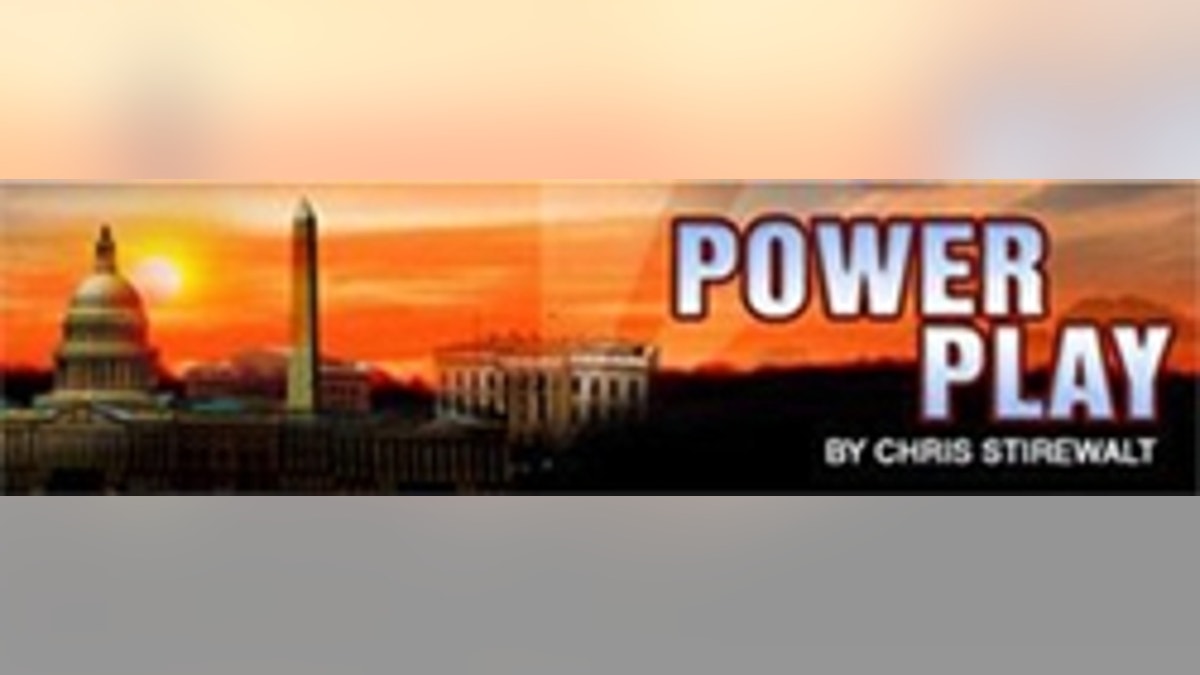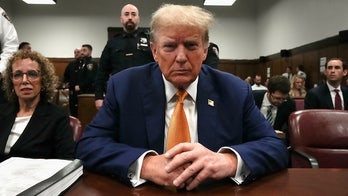
Chris Stirewalt's Power Play is available for a limited time on the America's Election HQ blog. Check back for updates on new subscription offers for app users.
Health Care Law Court Fight Threatens Presidential Pivot
"At its core, this dispute is not simply about regulating the business of insurance - or crafting a scheme of universal health insurance coverage - it's about an individual's right to choose to participate."
-- U.S. District Judge Henry Hudson in his order declaring unconstitutional the provision in President Obama's national health-care law that requires all Americans to buy private insurance or enroll in a government program.
A federal judge in Richmond has taken an axe to the tent pole at the center of President Obama's agenda.
Judge Henry Hudson ruled in favor of Virginia Attorney General Ken Cuccinelli, who argued that the citizens of the commonwealth cannot be forced to purchase private health insurance.
If the ruling were to stand, insurance companies could not afford to offer all of the new benefits required by the law. Only by forcing those who do not desire health insurance to purchase it can the rest of the scheme work.
Administration lawyers argued that it was a tax like any other and that the government had the power to regulate the interstate business of health insurance and tax its conduct (or in this case, non-conduct). This is a 180-degree reversal from the argument the president made during the long march to passage that the penalties for not having coverage were fines for bad behavior, not taxes.
Obama the candidate opposed such fines, arguing that coercion was the wrong way to expand coverage. But, he added the provision to his plan because he was unable to pass a plan that included a government-run insurance program.
Without the "public option" taking up the least desirable insurance customers, there was no way to add those folks to the system without bankrupting the private insurance sector unless the most desirable customers - the young and healthy - were forced to buy in.
It may have saved the plan politically, but it introduced a concept unknown in American domestic programs - the compulsory purchase of a private product - and jeopardized the future of the definitive initiative of his presidency.
It will likely be more than a year before the case makes its way to the Supreme Court, and by then may be joined by an administration appeal of another lawsuit, this one including 20 states and the National Federation of Independent Businesses, expected to be decided soon in a Florida federal court.
There has been some talk about the administration joining with Virginia to ask that the case move immediately to the Supreme Court, but that is hardly in the President's interest.
First, the more of the plan that is in place, the harder it would be for a court to undo. Second, 74-year-old Justice Antonin Scalia or one of the other three conservative members of the high court might leave the bench in the time it takes for the case to ripen, giving Obama the chance to change the balance of the court before it decides the fate f his agenda.
But Scalia is no doubt eating his Wheaties. This is the central legal battle of our times, and no judge would miss the chance to shape its outcome. And with four conservatives and the libertarian-leaning Justice Anthony Kennedy on the court, the law seems very much in peril.
While Obama's legal team is wise not to expedite the case, having it hanging around over the next year will complicate other matters immensely. Everything that the president has done, from the assumptions in his budgets to his pursuit of peace with the business world, is predicated on the existence of a national health care law.
Plus, the possibility of reversal will empower moderate Senate Democrats who are looking for a way to neuter the legislation by weakening or eliminating the mandate, which proved so politically toxic this year.
With his legacy in doubt, Obama will be an uncertain political commodity.
Spending Bill Offers New Test for GOP
"This is precisely the business-as-usual behavior that Republicans told Tea Party voters they wouldn't engage in.''
-- Sen. John McCain (R-AZ) before casting a grudging vote for a tax compromise struck between his party and President Obama.
The Senate advanced the tax deal struck between President Obama and the GOP with an astonishing 83 votes. You couldn't get that many votes for a resolution in favor of Santa Claus.
But a tougher fight now lies ahead on a $1 trillion plan to fund the government for the next year.
The tax deal vote was a cannon shot over the bow of House Democrats. A piece of legislation with this kind of broad, bipartisan support isn't supposed to be tweaked, it's supposed to be ratified by acclamation.
And while House Democrats are still grousing about President Obama caving in too soon to Republican demands on the extension of all current tax rates, the third of the $900 billion plan that is either new spending or tax incentives looks pretty good to Democrats as the reality of a GOP House majority draws nearer.
Plus, a Democratic revolt in the House might permanently hamstring Obama. If Obama cannot speak for his party in Washington when negotiating with Republicans, he's already a lame duck.
But now comes the harder part.
The House, which failed for the first time in 36 years to even offer a budget, has offered up a $1.1 trillion spending package to cover the next year. Senate Democrats have a similar $1 trillion measure.
Marbled with fat, the bills would basically continue existing funding levels with inflationary increases and some special considerations for favored programs.
Conservatives say that all that should be done is a short "continuing resolution" to keep the government operating for a few months after the current stopgap measure expires on Dec. 18.
But fearing a government shutdown and perhaps hoping to avoid some headaches induced by tackling a budget right off the bat, some Republicans are quietly suggesting that the Senate GOP shouldn't block the plan.
The measure will be served up today, and the right will be watching very closely as GOPers cast their votes.
Steele Won't Go Without a Fight
"I'm much more of a street guy. I love hanging out in boardrooms, but I prefer to be in neighborhoods and communities. My first trip as chairman was to go to Harlem. And a number of members asked me, ‘Why are you going to Harlem?' Because that's where the votes are."
-- Republican National Committee Chairman Michael Steele "On the Record With Greta Van Susteren."
It takes only 85 votes to get elected chairman of the Republican National Committee, but Michael Steele has guaranteed that the contest for those ballots will be as fierce as anything we saw in this fall's elections.
Next month's RNC election will see an embattled but defiant Steele taking on a crowded field of challengers in the hope that a divided opposition could allow him to squeeze into a second term.
Steele likely can count on the support of about 35 members of the 168-prson committee on the first ballot, enough to advance into subsequent rounds and start making new deals. His careful cultivation of oft-overlooked state parties in small or heavily Democratic places will pay off with those votes.
How likely Steele is to be viable then depends on who else advance along with him. If his many detractors close ranks and back a single opponent, likely former Steele insider Wisconsin state GOP Chairman Reince Priebus or veteran national party executive Maria Cino, Steele would be swiftly undone.
But if the "anybody but Steele" camp is divided, the chairman can't be counted out.
Wikileaks Puts Strain on U.S./U.K. Relations
"Many of the people who will form the new government have been outside of government policy circles for a long time, and they may have a simplistic point of view on CT [counter-terrorism] issues."
-- Wikileaked U.S. diplomatic cable warning of deficiencies in the new British government.
A British court is hearing arguments about whether to grant bail to Wikileaks founder Julian Assange while he awaits an extradition as a suspect in a Swedish rape investigation.
The U.S. government would hardly like to see Assange released, given that Attorney General Eric Holder is looking for a way to bring charges against him for the leaking he does. Plus, it would be something of an embarrassment to have the man who had done so much damage to American prestige on the loose again.
But today, the leaks continue, with a new revelation in The Guardian newspaper that the U.S. government thinks Britons are unserious about addressing the growing jihadi threat in their nation.
Frank cables that scorn the multicultural outreach of the previous Labour government and that call the current fusion government "simplistic" in its approach are all over the British papers today.
The criticism takes new life from the fact that the suicide bomber who attacked a crowded Swedish shopping center was perpetrated by Iraqi-born Taimour Abdulwahab al-Abdaly, who spent a decade in England and was known in the Muslim community there as a radical.
American diplomats need the Brits to help stop the Wikileaks, but the Wikileaks make the Brits feel less charitable toward helping American diplomats. Sticky wicket, that.
Droopy Dollar Still Wilting
"The world economy is, slowly but surely, moving from greenbacks to redbacks."
-- Qu Hongbin, China economist at international bank HSBC, to the Financial Times on the growing use of Chinese currency for international trade.
The great security of the U.S. dollar has been its position as the world's reserve currency. Its position as the world's reserve currency has been based on its great security. A nice positive feedback loop.
China, though, has made it a point of national pride to have its bright red yuan overtake the mellow green dollar as the standard currency for international trade.
Caterpillar has now followed McDonalds as American companies that have done bond offers backed in yuan, not dollars. Its good business and better politics for companies that rely heavily on the good favor of the Beijing government to tap China's expanding markets.
China and Russia have already agreed to ditch the dollar for deals between the two countries and even allies have expressed concern that the effort to jolt the domestic economy with great gushers of green ink at the Federal Reserve make the buck a bad bet for the future.
China may be buying trouble by allowing its currency, always carefully guarded, to be traded. China's fast-growing economy is unstable and its currency is the most famously fraudulent in the world. Soros-like currency speculators could deliver a terrible blow to the rising dragon.
But with the Euro now the punch line to a very expensive joke and the dollar devalued, China may be able to replace Ben Franklin with Chairman Mao. And once unseated, the dollar would be hard to put back on top of the currency pile.
And Now, A Word From Charles
"Liberal Democrats will do what they did with health care when they bluffed about opposing the bill if there were no public option. In the end, they supported the bill. This is also a bluff. There is no way they will undo this with the president on the line and where they will be the ones responsible if taxes are raised on January 1."
-- Charles Krauthammer on "Special Report with Bret Baier" discussing Democratic threats to scuttle an Obama-GOP tax deal.




